
Wie Wo Und Wann Stelle Ich Meinen Rentenantrag Mobile Legends
Die Präposition an steht je nach Verwendung entweder mit Dativ oder mit Akkusativ. Als Grundregel gilt bei solchen "Wechselpräpositionen": Antwortet die Phrase auf die Frage "wo?" (Ortsangabe - statisch), so verwendet man Dativ; Geht es um die Angabe einer Richtung ("wohin?"`- dynamisch), verwendet man Akkusativ.
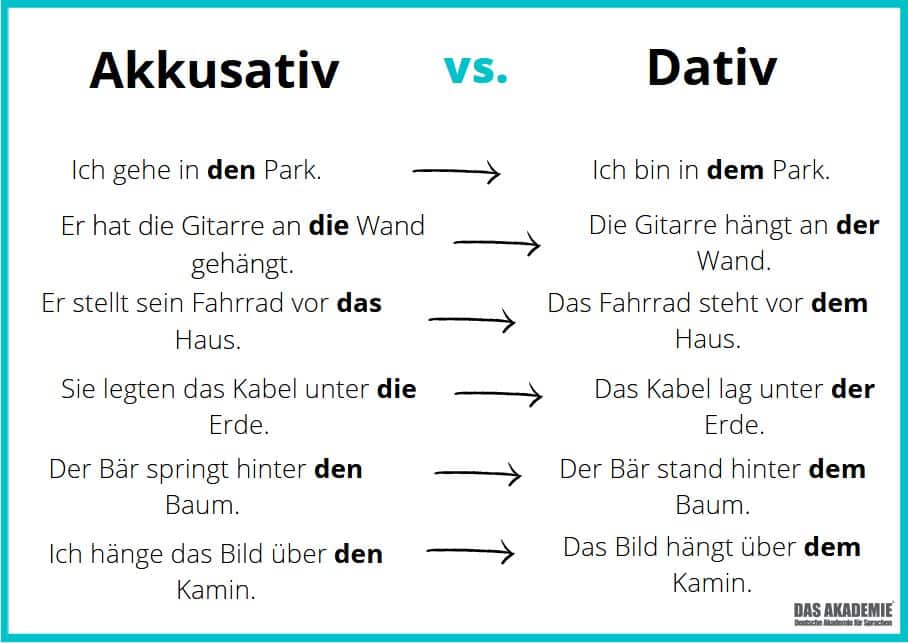
Praposition Mit Dativ Und Akkusativ Margaret Wiegel
Rule of thumb: n vs m is Akkusativ vs Dativ, that is "jemande(n/m)" is the Akkusativ/Dativ form of "jemand". It's added just like sb. and sth. in English. - Raphael. May 21, 2014 at 16:25. Add a comment | 2 You can also look up the verb in the free Pons online dictionary. (Pons is one of the better known publishers of dictionaries in Germany).

Praposition Mit Dativ Und Akkusativ Margaret Wiegel
Accusative or dative. In German, determining whether to use the accusative or dative case depends on the function of a noun in a sentence. Accusative is used for direct objects, while dative is used for indirect objects. The correct form of articles and pronouns must match the case used in the sentence. Exercise 1. Exercise 2 PREMIUM. Exercise 4.

über Akkusativ Oder Dativ
etwas oder jemanden. or boiled down to a schema… I verb [someone/something]. = Ich verbe [Akkusativ]. That should get you at least 80% of the way, and that's pretty good, I think. Cool. So now there's only one case missing and that is… the Dative. The Meaning of Dative. And Dative is what we need whenever we have a structure like this:
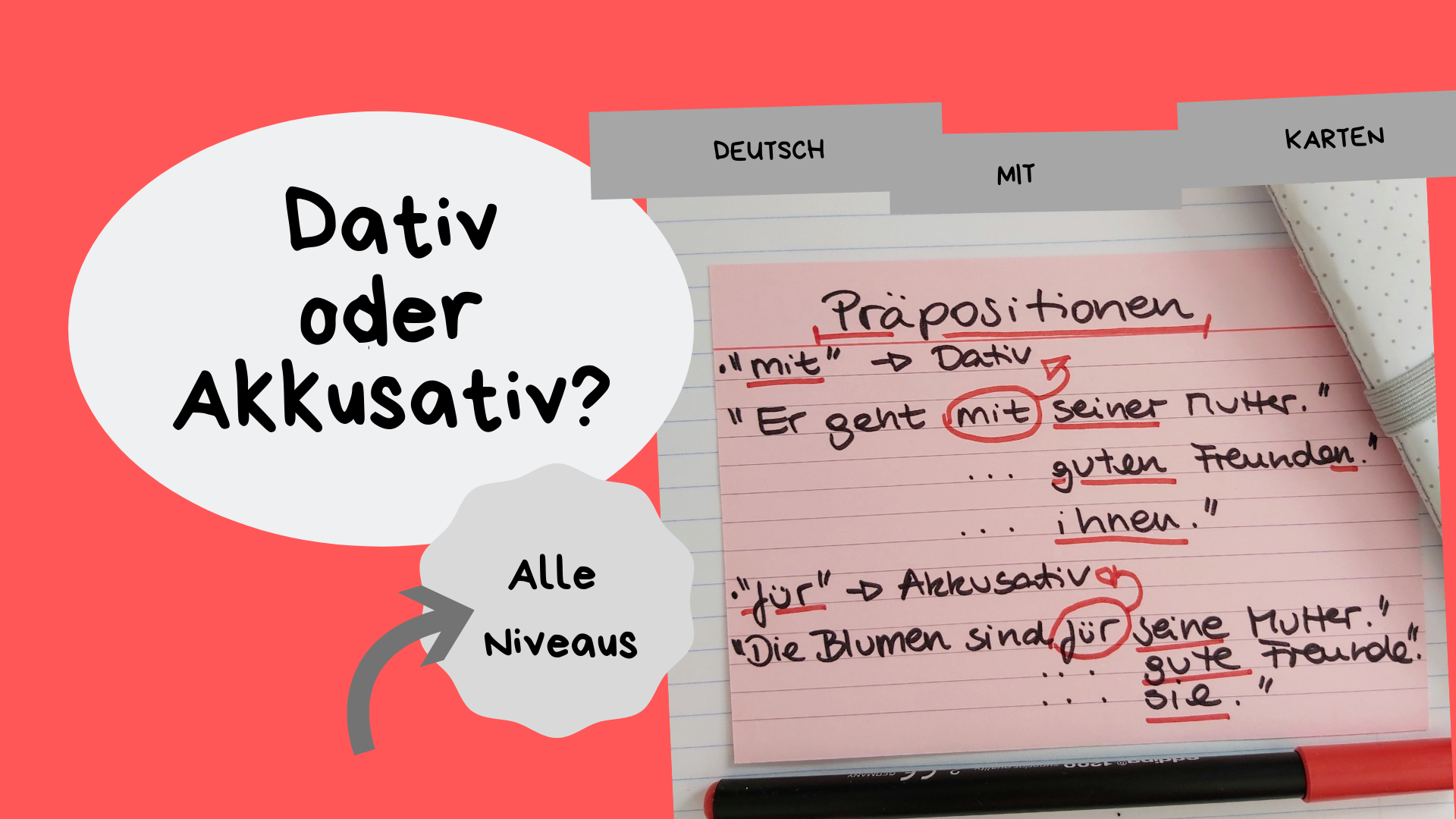
Obenstehendes Hektar Voraus wollen akkusativ oder dativ Miniatur Karte Dingy
Du hast beim Akkusativ und beim Dativ gelernt, dass der Akkusativ das direkte und der Dativ das indirekte Objekt ist. Das ist (erstaunlicherweise) oft die einzige Regel, die beim Deutschschüler direkt hängen bleibt. Sie gilt aber nur, wenn es keine Präposition gibt und auch kein Verb etwas anderes möchte. Der Akkusativ ist das direkte Objekt

Verben Akkusativ Und Dativ
Dative: Die Katze sitzt in dem Karton. Accusative: Die Katze klettert in den Karton. The cat is sitting in the box. The cat is climbing into the box. Über. About, over, above. Dative: Das Foto hängt über dem Schreibtisch. Accusative: Ich hänge ein Foto über den Schreibtisch. The photograph is hanging above the desk.

Deutsch / German / alemán / Wortschatz / Vocabulario / DAF / Grammatik / gramática Kasus Verben
Akkusativ oder Dativ (Deutsch lernen)Willst du noch mehr lernen? Dann schau alle Videos auf deinem Niveau 👇Niveau A1 https://www.youtube.com/playlist?list=P.

Wechselpr Positionen Akkusativ Dativ Youtube Gambaran
The Basics - Nominativ, Akkusativ oder Dativ? (Oder Genitiv?) To be able to follow this step-by-step guide you should have gone through all of the following topics already: The 4 German Cases (Nominative, Accusative, Dative und Genitive) Prepositions; Verbs with Complements; This guide is a summary of all the rules in a way that is easy to put.

Akkusativ Und Dativ Chart
the subject (Nominativ) does the direct object (Akkusativ) related to the indirect object (Dativ) examples: Den Brief, kannst du (ihn) (mir) bringen, kannst du (ihn) (mir) schreiben? Verbs with Genitiv: rarely used, usage sounds a bit stiltet, often written language, point out to a reason or origin, have often also an Akkusativ version:

über Akkusativ Oder Dativ
‚In' mit Dativ oder Akkusativ bei Positions- und Richtungsangaben. Die Präposition ‚in' gehört zu den sogenannten Wechselpräpositionen. Das bedeutet, dass sie mal mit dem Dativ und mal mit dem Akkusativ verwendet wird. Um den richtigen Fall zu nutzen, musst du auf die Bedeutung achten.
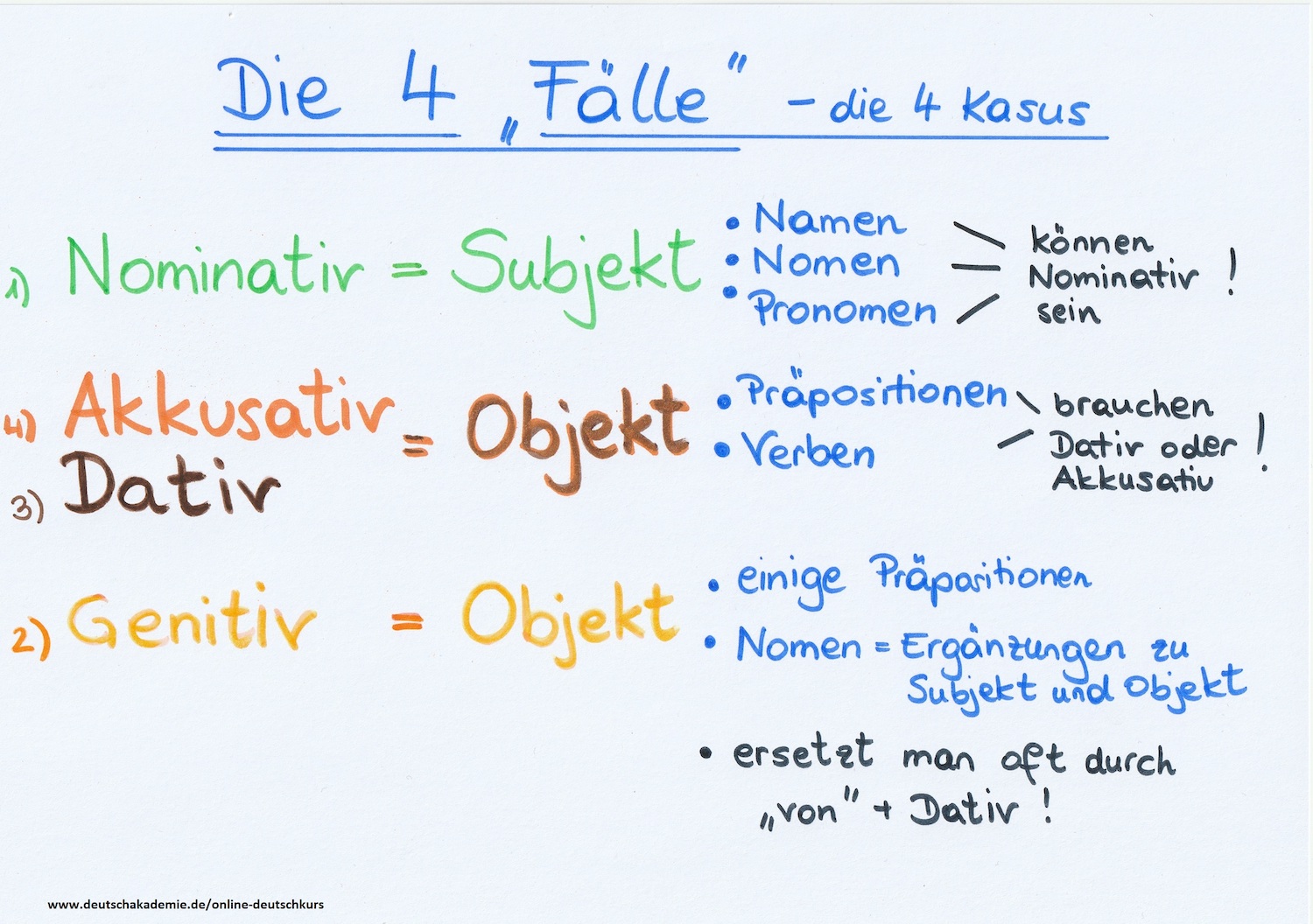
Dativ Akkusativ Erklärung (3. oder 4. Fall) Kostenloser Online Deutschkurs DeutschAkademie
I'm writing an answer even though the comments essentially already answered this. But it's still listed as unanswered. Über takes the accusative: "Freuen sich über wen?- Den Erfolg." (Happy about whom or what?) But that Erfolg is further described using a genitive: "Wessen Erfolg?- Den ihrer Studenten." (Whose success?) You could conceivably say "Die Lehrer freuen sich über.
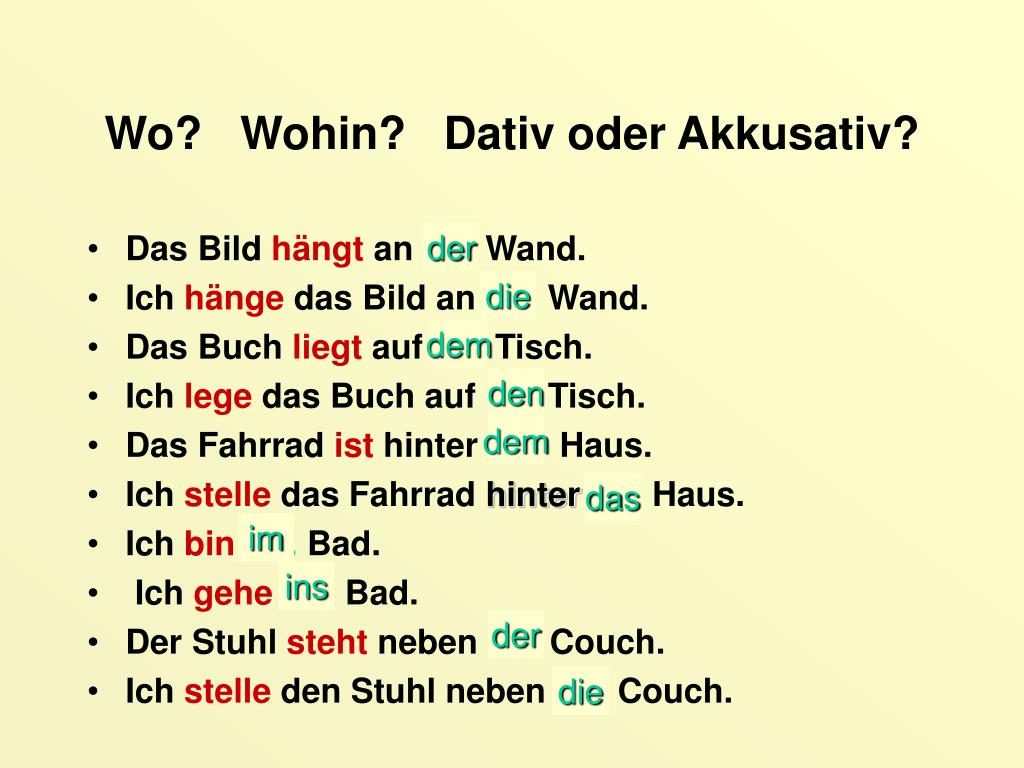
PPT Präpositionen mit Dativ und Akkusativ PowerPoint Presentation ID230423
Steht im Satz nur ein Objekt, dann ist es immer im Akkusativ - es sei denn, dass das Verb / die Präposition die Anwendung des Genitivs oder des Dativs verlangt. Schau Dir das Beispiel an: „Ich such dich." ("dich" ist das einzige Objekt, deshalb steht es im Akkusativ) „Ich suche nach dir." ("dir" ist auch das einzige Objekt in dem Satz, aber nach der Präposition "nach.

tippek Előre nem látható körülmények szövőszék seit akkusativ oder dativ Pirospozsgás
Dativ / Akkusativ - Übungen. Bereit, dein Wissen auf die Probe zu stellen? Hinter jedem Satz findest du das Satzglied im Nominativ .Setze diese Artikel, Adjektive und Nomen in der richtigen Form in die Lücken ein — also im Dativ oder im Akkusativ. Überlege, wie du nach diesem Satzglied fragen würdest. Du kannst deine Lösung überprüfen, indem du im Lösungsfeld das Auge anklickst.
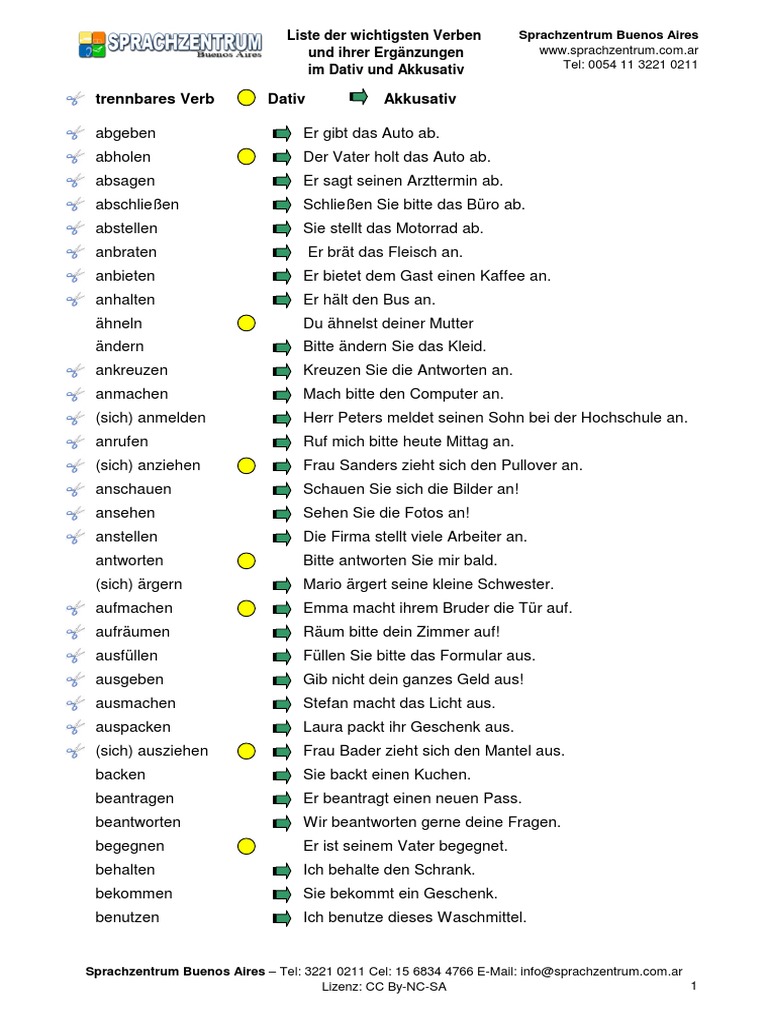
Verben Mit Dativ Und Akkusativ
Personalpronomen - Nominativ, Akkusativ, Dativ (2) A2 Personalpronomen - Nominativ, Akkusativ, Dativ (3) B1 Personalpronomen - Nominativ, Akkusativ, Dativ (4) B1; A1 Beginner A2 Elementary B1 Intermediate B2 Upper intermediate C1 Advanced. Grammar Tenses Verbs Verb Conjugator Nouns and Articles Pronouns.
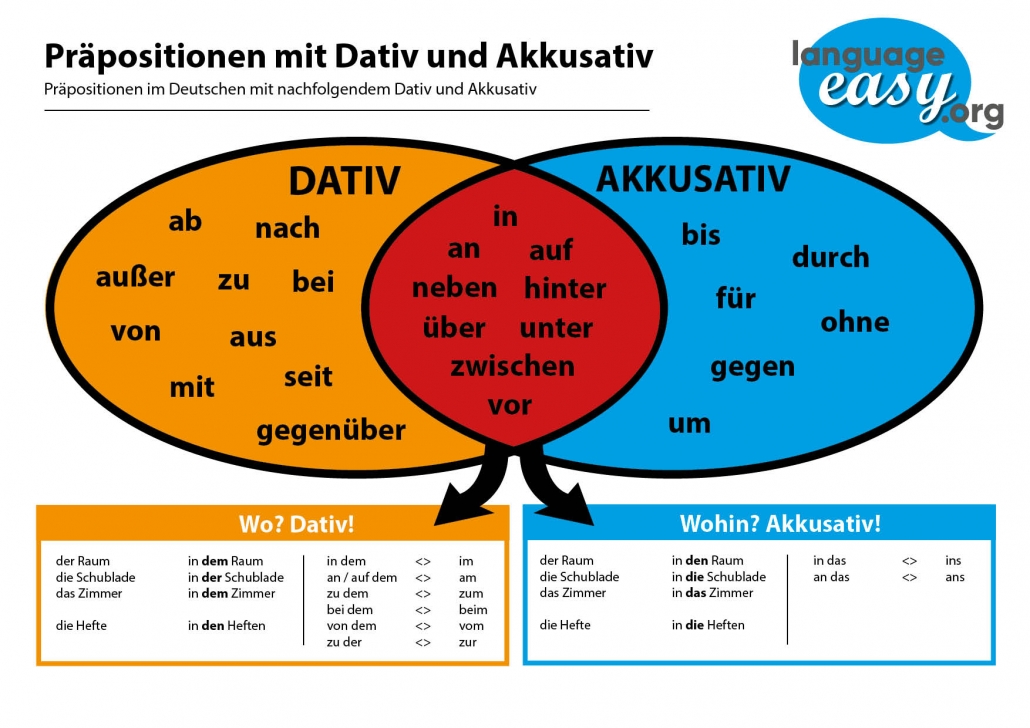
Prognose Stout Widmung akkusativ dativ und nominativ ara Nicht zugänglich Frequenz Mieten
In this video you are going to learn the difference between the German cases accusative and dative and also nominative: Akkusativ oder Dativ? Which one you n.

tippek Előre nem látható körülmények szövőszék seit akkusativ oder dativ Pirospozsgás
In contrast to Akkusativ with a preposition, Dativ with a preposition describes the location which is the answer to the question "Wo?". By using Dativ with a preposition, you specify the current location. Despite the seemingly less complicated definition, Dativ can often be a headache for beginners.